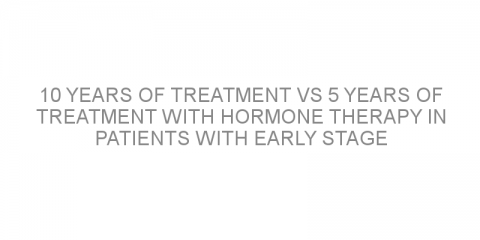In a nutshell This article investigated the safety and effectiveness of durvalumab (Imfinzi) for the treatment of unresectable non-small-cell lung cancer (NSCLC). The authors concluded that durvalumab is safe and can improve survival of these patients. Some background Non-small cell lung cancer (NSCLC) is the most common kind of lung cancer....
Read MoreCurrent stage?-Stage III Posts on Medivizor
Can white blood-cell levels predict tumor response in rectal cancer?
In a nutshell This study investigated if a change in white blood cell (WBC) levels before or during chemotherapy and radiation therapy are associated with rectal tumor response. Researchers suggested that a decreased level of WBC is associated with improved tumor response in patients with rectal cancer. Some background Chemotherapy and radiation...
Read MoreAtezolizumab and Nab-Paclitaxel in Advanced Triple-Negative Breast Cancer.
In a nutshell This study wanted to see how well two medications worked in treating advanced triple negative breast cancer, atezolizumab (Tecentriq) and nab-paclitaxcel (Abraxane). The study found that using these two medications together improved survival in these patients. Some background Triple-negative breast cancer (TNBC) is breast cancer...
Read MoreGuidelines for hypofractionated radiation therapy for localized prostate cancer
In a nutshell This study reviewed the current recommendations for treatment doses of radiation therapy for different stages of prostate cancer. Some background Hypo-fractionated radiation therapy (HFRT) for early-stage prostate cancer is a safe and effective treatment option. It involves a shorter course of treatment with larger doses...
Read MoreMetronomic chemotherapy for HR+ advanced breast cancer
In a nutshell This study wanted to see how well using metronomic chemotherapy with capecitabine (Xeloda) combined with aromatase inhibitors works for patients with hormone receptor positive advanced breast cancer. The study found that this treatment works well and is safe, and therefore should be considered as a potential treatment option. Some...
Read MoreTreatment for advanced melanoma with abnormal genes
In a nutshell This study wanted to find out which treatment for melanoma cancer worked better, encorafenib (Braftovi) + binimetinib (Mektovi), encorafenib alone, or vemurafenib (Zelboraf) alone. The study found that encorafenib + binimetinib worked well and was safe, compared to vemurafenib and encorafenib. Some background In about 50% of patients...
Read MorePalbociclib and Fulvestrant in Advanced Breast Cancer.
In a nutshell This study investigated the overall survival rates of people with breast cancer who were treated with either palbociclib (Ibrance) plus fulvestrant (Faslodex), or just fulvestrant. The study found that the patients who received both palbociclib and fulvestrant had a longer overall survival compared to the group who only received...
Read MoreLaparoscopic surgery is associated with improved quality of life in patients with colon cancer
In a nutshell This study compared open surgery to laparoscopic surgery (LS; a tube with a camera is inserted through a small cut to remove the tumor) in terms of quality of life in patients with colon cancer. Researchers suggested that patients treated with LS had an improved quality of life after surgery. Some background Colon cancer is...
Read MoreTVEC as a treatment for advanced melanoma
In a nutshell This study analysed a treatment for late-stage melanoma called talimogene laherparepvec (TVEC). It found that treating late-stage melanoma with TVEC was effective, and had only minor side effects. Some background Talimogene laherparepvec (TVEC) (Imlygic) is a treatment used for late-stage melanoma which is unable to be operated on. TVEC...
Read More10 years of treatment vs 5 years of treatment with hormone therapy in patients with early stage breast cancer.
In a nutshell This study wanted to find out if continuing hormone therapy for 10 years was more effective than doing it for 5 years in patients with early stage breast cancer. The study found that the patients who continued treatment for 10 years survived for longer without the disease coming back compared to those who were only treated for 5...
Read MoreBetter survival for patients with new metastatic prostate cancer with previous prostate surgery
In a nutshell This study aimed to investigate the effect previous treatment has on overall survival for patients with metastatic (spread) prostate cancer. This study found that patients who had previous prostate surgery and radiation had improved overall survival. Some background Localized prostate cancer can be treated using prostate-removing...
Read MoreCyroablation for the treatment of early stage prostate cancer
In a nutshell This study evaluated the long-term safety and effectiveness of cryoablation (a process that uses extreme cold to destroy tissue) for patients with early prostate cancer. This study found that cryoablation is safe and effective for early-stage prostate cancer. Some background Cryoablation is a treatment option for early-stage prostate...
Read More














